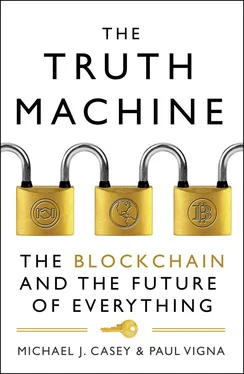But it’s not just in developing countries, or in the realm of non-profit charity and development work, that blockchain technology shows potential. Far from it. In the developed world, too, and within the boardrooms of plenty of Fortune 500 for-profit companies, there is a scramble to unleash what many believe could be a major force for economic growth. That’s because the blockchain is seen as capable of supplanting our outdated, centralized model of trust management, which goes to the heart of how societies and economies function.
Until now, we have relied on institutions such as banks, government registries, and countless other intermediaries to sit in the middle of our economic exchanges with each other. These “trusted third parties” maintain records on our behalf so that the rest of us have enough trust in the system to interact, exchange items of value, and, hopefully, build vibrant, functioning societies. The problem is that these fee-charging institutions, which act as gatekeepers, dictating who can and cannot engage in commercial interactions, add cost and friction to our economic activities. They also have a habit of failing us—we can think of the crisis of 2008 as a case of banks breaching their duty to maintain honest records—or of exploiting their toll-collecting power to price gouge and demand exorbitant rents. What’s more, there are plenty of situations in which it’s simply not economically viable for these costly, inefficient institutions to resolve whatever particular trust deficit is preventing people from doing business with each other. So, if we bypass those intermediaries, we will not only save money but also open up previously impossible business models.
The Internet put us on this disintermediating path some time ago, well before the blockchain came along. But it’s worth noting that at the heart of each new Internet application that cuts out some incumbent middleman there has typically been a technology that helps humans deal with their perennial mistrust issues. Who would have thought a decade ago that people would feel comfortable riding in the car of some stranger they’d just discovered on their phones? Well, Uber and Lyft got us over that trust barrier by incorporating a reputation scoring system for both drivers and passengers, one that was only made possible because of the expansion of social networks and communication. Their model showed that if we can resolve our trust issues with technology and give people confidence to transact, those people are willing and able to go into direct exchanges with complete strangers. These ideas are setting us on a path to a peer-to-peer economy.
What blockchain technology says is, “Why stop at Uber?” Why do we even need this particular company, which takes 25 percent from each ride and has a reputation for abusing its “God’s View” knowledge of passengers’ rides? How about a totally decentralized solution, such as the Tel Aviv–based, blockchain-powered ride-sharing application Commuterz? In that case no one owns the platform, which like Bitcoin is just based on an open-source software protocol that anyone can download. There’s no Commuterz, Inc. taking 25 percent. Instead, users own and trade a native digital currency system that incentivizes them to share rides to reduce traffic congestion and lower the cost of transportation for all.
The broad idea is that by deferring the management of trust to a decentralized network guided by a common protocol instead of relying upon a trusted intermediary, and by introducing new, digital forms of money, tokens, and assets, we can change the very nature of social organization. We can encourage new approaches to collaboration and cooperation that weren’t possible before, transforming a wide array of industries and organizational settings. Indeed, the breadth of blockchain’s potential is captured in the breadth of the ideas under consideration. Here is sampling of possible use cases, and it is by no means an exhaustive list:
Inviolable property registries, which people can use to prove that they own their houses, cars, or other assets;
Real-time, direct, bank-to-bank settlement of securities exchanges, which could unlock trillions of dollars in an interbank market that currently passes such transactions through dozens of specialized institutions in a process that takes two to seven days;
Self-sovereign identities, which don’t depend on a government or a company to assert a person’s ID;
Decentralized computing, which supplants the corporate business of cloud computing and Web hosting with the hard drives and processing power of ordinary users’ computers;
Decentralized Internet of Things transactions, where devices can securely talk and transact with each other without the friction of an intermediary, making possible big advances in transportation and decentralized energy grids;
Blockchain-based supply chains, in which suppliers use a common data platform to share information about their business processes to greatly improve accountability, efficiency, and financing with the common purpose of producing a particular good;
Decentralized media and content, which would empower musicians and artists—and, in theory, anyone who posts information of value to the Net—to take charge of their digital content, knowing they can track and manage the use of this “digital asset.”
Blockchain technology could help achieve what some commentators are calling the promise of “Internet 3.0,” a re-architecting of the Net to assert the core objective of decentralization that inspired many of the early online pioneers who built the Internet 1.0. It turned out that simply giving networks of computers a way to share data directly wasn’t enough to prevent large corporate entities from taking control of the information economy. Silicon Valley’s anti-establishment coders hadn’t reckoned with the challenge of trust and how society traditionally turns to centralized institutions to deal with that. That failure was clear in the subsequent Internet 2.0 phase, which unlocked the power of social networks but also allowed first-mover companies to turn network effects into entrenched monopoly power. These included social media giants like Facebook and Twitter and e-marketplace success stories of the “sharing economy” such as Uber and Airbnb. Blockchain technologies, as well as other ideas contained in this Internet 3.0 phase, aim to do away with these intermediaries altogether, letting people forge their own bonds of trust to build social networks and business arrangements on their own terms.
The promise lies not just in disrupting the behemoths of the Internet, however. Lots of large, twentieth-century, for-profit companies believe this technology can help them unlock value and pursue new money-making ventures, too. Some see big opportunities, others a major threat. Either way, many incumbent businesses now feel compelled to at least experiment with and explore the development of this technology to see where it goes.
In finance, the very industry that Bitcoin was designed to make redundant, bankers are waking up to the possibility that blockchain-related technologies could replace the cumbersome processes by which securities and money are transferred, cleared, and settled between banks. Using a reliable, distributed ledger that a consortium of banks can update simultaneously in real time could reduce back-office costs and unshackle large amounts of new capital for investment. That’s great news for investment banks such as Goldman Sachs, but not so great for custodial banks like State Street or clearinghouses like the Depository Trust & Clearing Corporation, whose business model is based on handling those back-office functions. Still, the institutions on both sides of that disruption story all feel compelled to engage in research and development in this field.
Читать дальше












